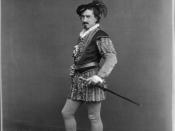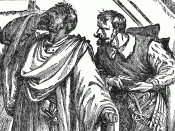Iago's soliloquies (II, iii, 304-329)
And what's he then that says I play the villain,
When this advice is free I give, and honest,
Probal to thinking, and indeed the course
To win the Moor again? For 'tis most easy
Th'inclining Desdemona to subdue
In any honest suit. She's framed as fruitful
As the free elements; and then for her
To win the Moor, were't to renounce his baptism
All seals and symbols of redeemed sin,
His soul is so enfettered to her love,
That she may make, unmake, do what she list,
Even as her appetite shall play the god
With his weak function. How am I then a villain
To counsel Cassio to his parallel course
Directly to his good? Divinity of hell!
When devils will the blackest sins put on,
They do suggest at first with heavenly shows
As I do now. For whiles this honest fool
Piles Desdemona to repair his fortunes,
And she for him pleads strongly to the Moor,
I'll pour pestilence into his ear:
That she repeals him for her body's lust;
And by how much she strives to do him good.
She shall undo her credit with the Moor.
So will I turn her virtue into pitch,
And out of her own goodness make the net
That shall enmesh them all.
A soliloquy is a dramatic convention that allows a character to speak directly to an audience indicating their motives, feelings and decision . We learn more about a character through a soliloquy than the actions of the play alone.
The soliloquy in Act 3 Scene 3 304-329 shows us of Iago's plan to deceive Othello, mislead Cassio and use Desdemona for his treacherous plan that will eventually lead to the ultimate tragedy of the play. Iago, one of William Shakespeare's most intriguing and plausible villains in the book of Othello, is often described as being completely evil. The dramatic quality of Iago can be portrayed as inherently evil while at the same time being mysterious and unfathomable. The use of poetic technique in Iago's soliloquy reveals his motive, personality and the true 'light' behind the play based on deceit. Trickery and manipulation of language is Iago's power as he is able to slip between prose and verse, adopting his style to suit his different audiences and purposes. There is dramatic irony, parody and use of figurative language (the imagery). The play works on stage through using a proscenium arch style theatre that focuses on a one sided view to focus on one 'perspective.' This method of theatre was successful, modelled from the 'theatre-in-the-round' version and became the type of theatre we used today.
Iago is portrayed as a cold blooded monster that does not have the conscience and heart of a normal human being. Shakespeare uses effective characterisation and language technique to not only portrays characters through soliloquy, but to make it the character interesting. At the beginning of the speech, Iago reflects on how no one can accuse him of being the villain when he offers such 'good', 'helpful' advice. We can see that he manipulates a lot of the characters and knows that he is acting. We see Iago's true maliciousness in this speech as he intends to use Desdemona's good nature to "enmesh them all"; he wants to destroy an innocent with whom he has no quarrel so that he can carry out his revenge. The speech shows Iago's delight in his own cunning and acting abilities, revelling in the fact that he has the power to turn Desdemona's "virtue into pitch". As is typical throughout the play, Iago shows that he has nothing but contempt for honesty and innocence and he looks forward to corrupting them, associating honesty with foolishness. Iago's loyalty is only to himself, and he even plans to use his wife in his scheme. The imagery Iago uses is again crude and materialistic, he will persuade Othello that Desdemona pleads for Cassio for her "body's lust", and without her knowing it, her conviction in Cassio and her pleas for him to be forgiven by Othello only serve to "undo her credit with the Moor". Iago's language in his soliloquies emphasises his deception, as with Othello and Cassio, he is generally polite and guarded. The soliloquy serves to provide the audience with another view into his evil mind that he cannot express in dialogue with other characters as he is trying to manipulate them and needs them to think of him as honest and trustworthy.
The poetic technique in this soliloquy is effective as it not only expresses Iago's thought, motive etc but also reveals the character itself. Language is the source of Iago's power and as demonstrated in the soliloquy, he is able to switch between prose & verse and he is able to manipulate his style effortlessly. The soliloquy hints imagery of poisoning, in which we come to associate with Iago and his method of manipulation. Iago wants to "pour this pestilence into his ear" (II.3.351) and destroy Othello's "sweet sleep" (II.3.351). These references to poison are appropriate to Iago, whose actions are swift, insidious and deadly. There is dramatic irony: "what's he then that says play the villain" (II.3.239) when he is saying 'who can say I am evil when my advice is so good' when he is clearing addressing the audience who knows he is up to no good. There is clear parody as Iago tries to mock the audience as well as the characters. He says that his argument is like the "devil" putting on their "blackest sins" (II.3.317) and his reference to Satan suggest to him that he is heroic and that his argument is as cunning as the devil himself. Shakespeare's use of language evokes the private, social and cosmic theme about human life. In this soliloquy, the private aspect are jealously, power, revenge, hate etc which Iago dominates. The social aspect here is mainly about taking advantage of the relationship between Othello & Desdemona, to be able to that will lead to their tragedy. The universal aspect is about Iago taking advantage of people's ultimate weakness i.e. their emotion.
Soliloquies are used to convey information and for particular dramatic effect. In Othello, the evil ensign (Iago) speaks his soliloquy first, drawing the audience in as he outlines his intentions and ideas. Because we know exactly what his plans are, we might feel that Shakespeare forces us to collude with the villain and in order to play Iago, a clever and yet impressive actor is needed. The task of production is to lift the words from the page and give a visual reality to genre, character, identity and place. The play works on stage because of its ability to focus on universal theme, relate to Iago and the way he 'works' his soliloquy and let the audience understand the concept of tragedy, jealously, love etc that can be derived from the soliloquy.
Shakespeare uses the proscenium arch theatre, which was created after The Globe was burnt down. The theatre creates a 'window' around the scenery and actors. The advantages are that it gives everyone in the audience a good view because the actors need only focus on one direction rather than continually moving around the stage to give a good view from all sides . This is needed in a soliloquy as the audience need to face the actor playing Iago which becomes fundamental to understanding him. Allowing direct contact, front view look etc makes it easier for the audience to relate to him as the theatre makes it easier to focus on a particular character. The theatre had a roof, and three levels, top for higher class people, middle for middle class people and the yard for lower class people. Obviously the higher you are the better view possible. Shakespeare's play was written by this stage, but there is also a sense they were written by the stage. Shakespeare's play revolves around the theatre, for example, the play acknowledges the presence of the audience. It is not only by prologues, epilogues and choruses, but also in soliloquies. The actors isn't talking to an imaginary wall, they are talking to the audience. (soliloquy)
Iago's soliloquy in Act 2 Scene 3 features poetic, dramatic and theatrical qualities. Shakespeare uses these qualities to maximise the effectiveness his use of 'talking to the audience.' Iago's soliloquy has succeeded in emphasizing a strong sense of poetic technique, effective dramatic quality that reflects upon themes, concepts and characters and also theatrical quality that helped based the soliloquy.
![From the Library of Congress: TITLE: Thos. W. Keene. Othello CALL NUMBER: POS - TH - 1884 .O7, no. 1 (C size) [P&P] REPRODUCTION NUMBER: LC-USZC6-58 (color film copy transparency) RIGHTS INFORMATION: No known restrictions on publication. MEDIUM: 1 print (](https://s.writework.com/uploads/9/94760/library-congress-title-thos-w-keene-othello-call-number-pos-thumb.jpg)

